Sequential Implementation
CSC 235 - Computer Organization
References
- Slides adapted from CMU
Y86-64 Instruction Set

Building Blocks
- Combinational Logic
- Compute Boolean functions of inputs
- Continuously respond to input changes
- Operate on data and implement control
- Storage Elements
- Store bits
- Addressable memories
- Non-addressable registers
- Loaded only as clock rises
Sequential Hardware Structure
- State
- Program counter register (PC)
- Condition code register (CC)
- Register file
- Memories
- Instruction flow
- Read instruction at address specified by PC
- Process through stages
- Update program counter
Sequential Stages
- Fetch: read instruction from memory
- Decode: read program registers
- Execute: compute value or address
- Memory: read or write data
- Write back: write program registers
- PC: update program counter
Sequential Hardware Structure
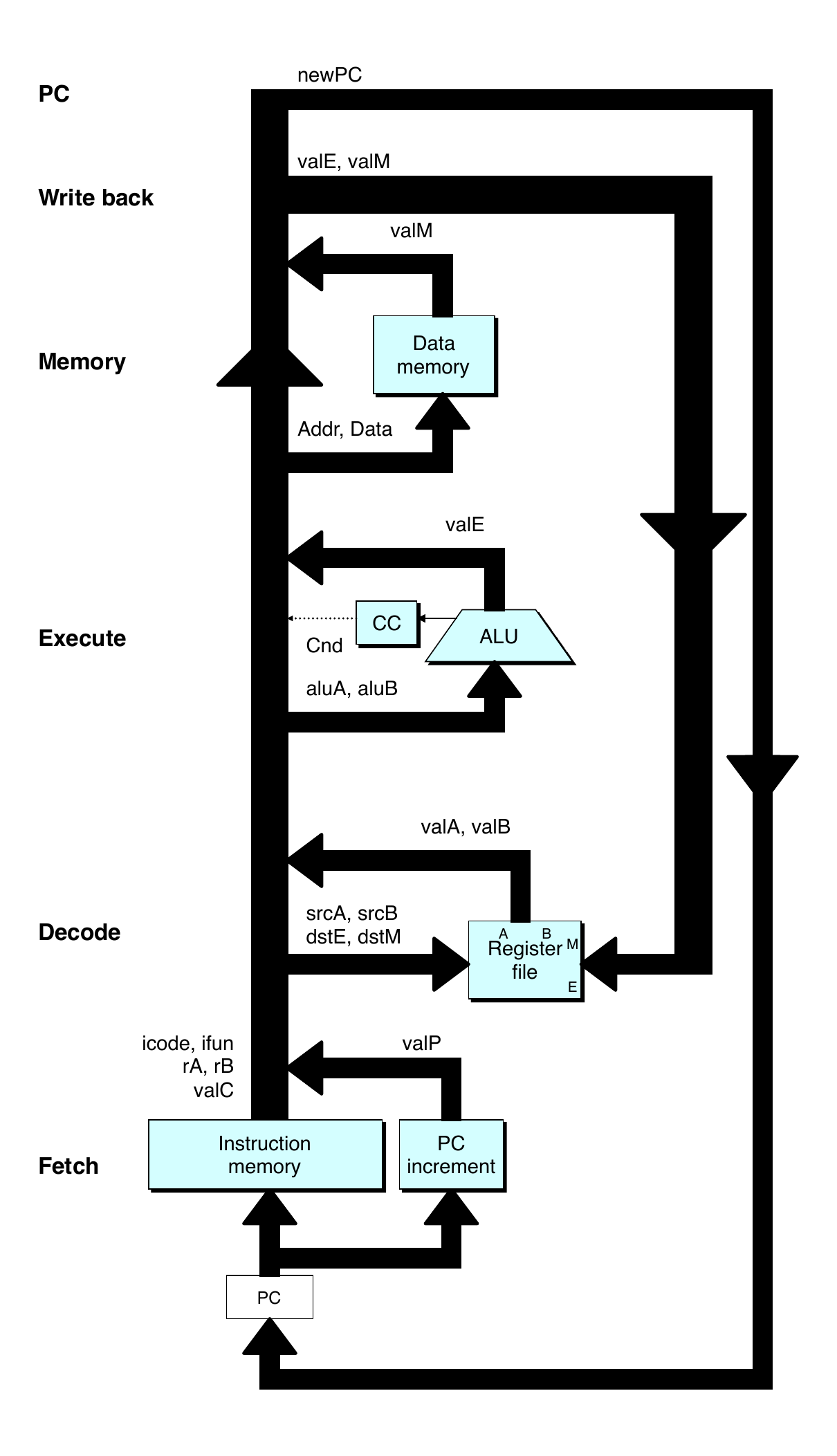
Instruction Decoding
- Instruction format (10 bytes max)
- Instruction byte:
icode:ifun - Optional register byte:
rA:rB - Optional constant word:
valC
- Instruction byte:
Executing Arithmetic/Logical Operation
- Fetch: read 2 bytes
- Decode: read operand registers
- Execute: perform operation and set condition codes
- Memory: do nothing
- Write back: update register
- PC update: increment PC by 2
Stage Computation: Arithmetic/Logical Operations
| Stage | Op rA rB |
Action |
|---|---|---|
| Fetch | icode:ifun = M1[PC] |
read instruction byte |
rA:rB = M1[PC+1] |
read register byte | |
valP = PC+2 |
compute next PC | |
| Decode | valA = R[rA] |
read operand A |
valB = R[rB] |
read operand B | |
| Execute | valE = valB OP valA |
Perform ALU operation |
| Memory | ||
| Write back | R[rB] = valE |
Write back result |
| PC update | PC = valP |
update PC |
Executing rmmovq
- Fetch: read 10 bytes
- Decode: read operand registers
- Execute: compute effective address
- Memory: write to memory
- Write back: do nothing
- PC update: increment PC by 10
Stage Computation: rmmovq
| Stage | rmmovq rA, D(rB) |
Action |
|---|---|---|
| Fetch | icode:ifun = M1[PC] |
read instruction byte |
rA:rB = M1[PC+1] |
read register byte | |
valC = M8[PC+2] |
read 8 byte displacement | |
valP = PC+10 |
compute next PC | |
| Decode | valA = R[rA] |
read operand A |
valB = R[rB] |
read operand B | |
| Execute | valE = valB + valC |
compute effective address (ALU) |
| Memory | M8[valE] = valA |
write 8 byte value to memory |
| Write back | ||
| PC update | PC = valP |
update PC |
Executing popq
- Fetch: read 2 bytes
- Decode: read stack pointer
- Execute: increment stack pointer by 8
- Memory: read from old stack pointer
- Write back: update stack pointer and write result to register
- PC update: increment PC by 2
Stage Computation: popq
| Stage | popq rA |
Action |
|---|---|---|
| Fetch | icode:ifun = M1[PC] |
read instruction byte |
rA:rB = M1[PC+1] |
read register byte | |
valP = PC+2 |
compute next PC | |
| Decode | valA = R[%rsp] |
read stack pointer |
valB = R[%rsp] |
read stack pointer | |
| Execute | valE = valB + 8 |
increment stack pointer (ALU) |
| Memory | valM = M8[valA] |
read 8 bytes from stack |
| Write back | R[%rsp] = valE |
update stack pointer |
R[rA] = valM |
write back result | |
| PC update | PC = valP |
update PC |
Executing Conditional Moves
- Fetch: read 2 bytes
- Decode: read operand registers
- Execute: if not condition, then set destination register to
0xF - Memory: do nothing
- Write back: update register (or not)
- PC update: increment PC by 2
Stage Computation: Conditional Move
| Stage | cmovXX rA, rB |
Action |
|---|---|---|
| Fetch | icode:ifun = M1[PC] |
read instruction byte |
rA:rB = M1[PC+1] |
read register byte | |
valP = PC+2 |
compute next PC | |
| Decode | valA = R[rA] |
read operand A |
valB = 0 |
read stack pointer | |
| Execute | valE = valB + valA |
pass val through ALU (valA + 0) |
if !Cond(CC,ifun) rB = 0xF |
(disable register update) | |
| Memory | ||
| Write back | R[rB] = valE |
write back result |
| PC update | PC = valP |
update PC |
Executing Jumps
- Fetch: read 9 bytes and increment PC by 9
- Decode: do nothing
- Execute: determine whether to take branch based on jump condition codes
- Memory: do nothing
- Write back: do nothing
- PC update: set PC to destination if branch taken or to incremented PC if not branch
Stage Computation: Jumps
| Stage | jXX Dest |
Action |
|---|---|---|
| Fetch | icode:ifun = M1[PC] |
read instruction byte |
valC = M8[PC+1] |
read 8 byte destination address | |
valP = PC+9 |
fall through address | |
| Decode | ||
| Execute | Cnd = Cond(CC, ifun) |
take branch? |
| Memory | ||
| Write back | ||
| PC update | PC = Cnd ? valC : valP |
update PC |
Executing call
- Fetch: read 9 bytes and increment PC by 9
- Decode: read stack pointer
- Execute: decrement stack pointer by 8
- Memory: write incremented PC to new value of stack pointer
- Write back: update stack pointer
- PC update: set PC to Dest
Stage Computation: call
| Stage | call Dest |
Action |
|---|---|---|
| Fetch | icode:ifun = M1[PC] |
read instruction byte |
valC = M8[PC+1] |
read 8 byte destination address | |
valP = PC+9 |
compute return point | |
| Decode | valB = R[%rsp] |
read stack pointer |
| Execute | valE = valB + -8 |
decrement stack pointer (ALU) |
| Memory | M8[valE] = valP w |
rite 8 byte return value on stack |
| Write back | R[%rsp] = valE |
update stack pointer |
| PC update | PC = valC |
set PC to destination |
Executing ret
- Fetch: read 1 byte
- Decode: read stack pointer
- Execute: increment stack pointer by 8
- Memory: read return address from old stack pointer
- Write back: update stack pointer
- PC update: set PC to return address
Stage Computation: ret
| Stage | ret |
Action |
|---|---|---|
| Fetch | icode:ifun = M1[PC] |
read instruction byte |
| Decode | valA = R[%rsp] |
read operand stack pointer |
valB = R[%rsp] |
read operand stack pointer | |
| Execute | valE = valB + 8 |
increment stack pointer (ALU) |
| Memory | valM = M8[valA] |
read return address |
| Write back | R[%rsp] = valE |
update stack pointer |
| PC update | PC = valM |
set PC to return address |
Computation Steps
| Stage | Steps | Action |
|---|---|---|
| Fetch | icode:ifun |
read instruction byte |
rA, rB |
[read register byte] | |
valC |
[read constant word] | |
valP |
compute next PC | |
| Decode | valA, srcA |
[read operand A] |
valB, srcB |
[read operand B] | |
| Execute | valE |
perform ALU operation |
Cond code |
[set/use condition code] | |
| Memory | valM |
[memory read/write] |
| Write back | dstE |
[write back ALU result] |
dstM |
[write back memory result] | |
| PC update | PC |
update PC |
Computed Values
- Fetch
icode: instruction codeifun: instruction functionrA: instruction register ArB: instruction register BvalC: instruction constantvalP: incremented PC
Computed Values
- Decode
srcA: register ID AsrcB: register ID BdstE: destination register EdstM: destination register MvalA: register value AvalB: register value B
Computed Values
- Execute
valE: ALU resultCnd: branch/move flag
- Memory
valM: value from memory
Sequential Hardware
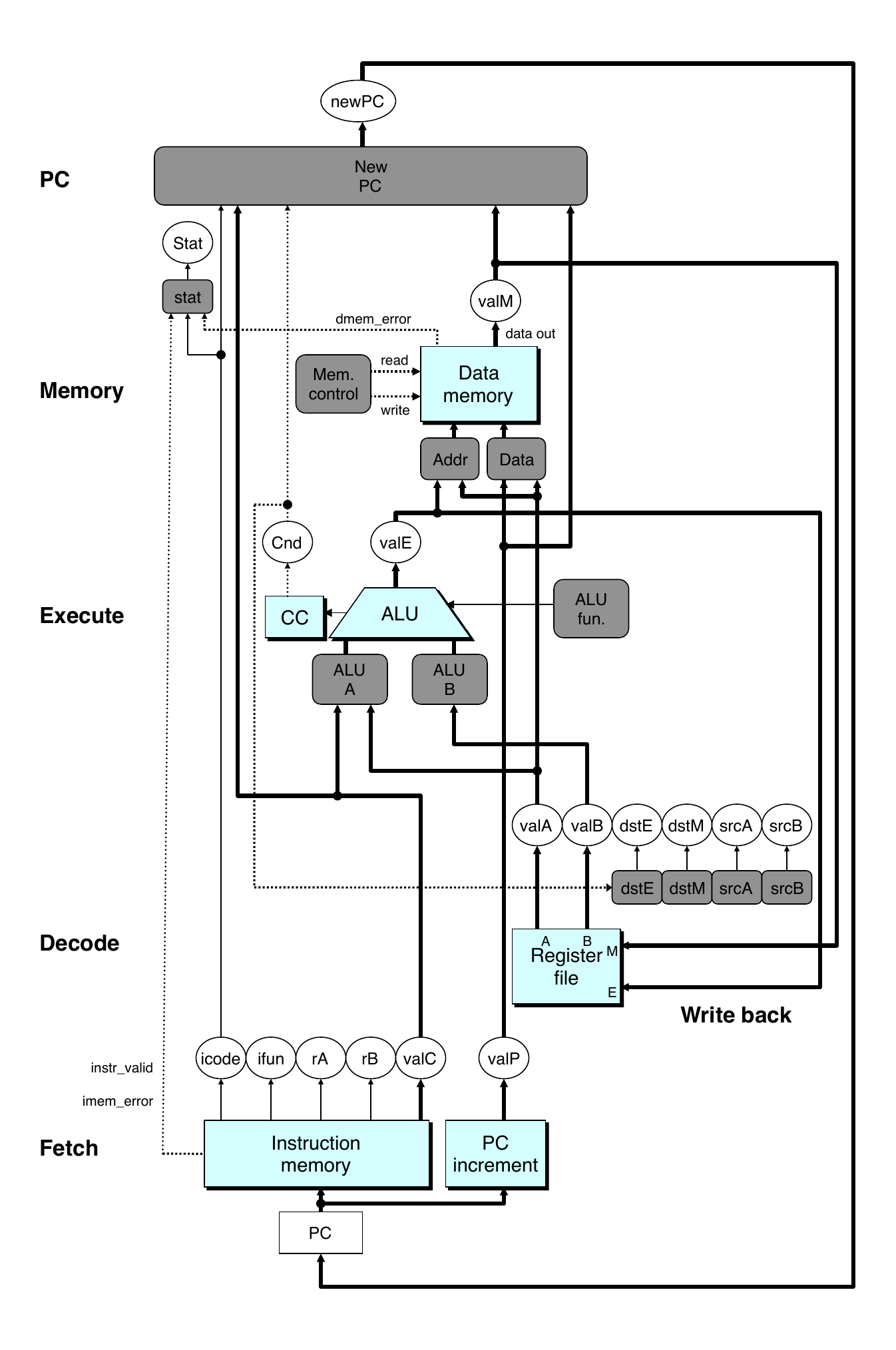
Sequential Hardware
- Diagram key
- Blue boxes: pre-designed hardware blocks
- Gray boxes: control logic
- White ovals: labels for signals
- Thick lines: 64-bit word values
- Thin lines: 4-8 bit values
- Dotted lines: 1-bit values
Fetch Logic
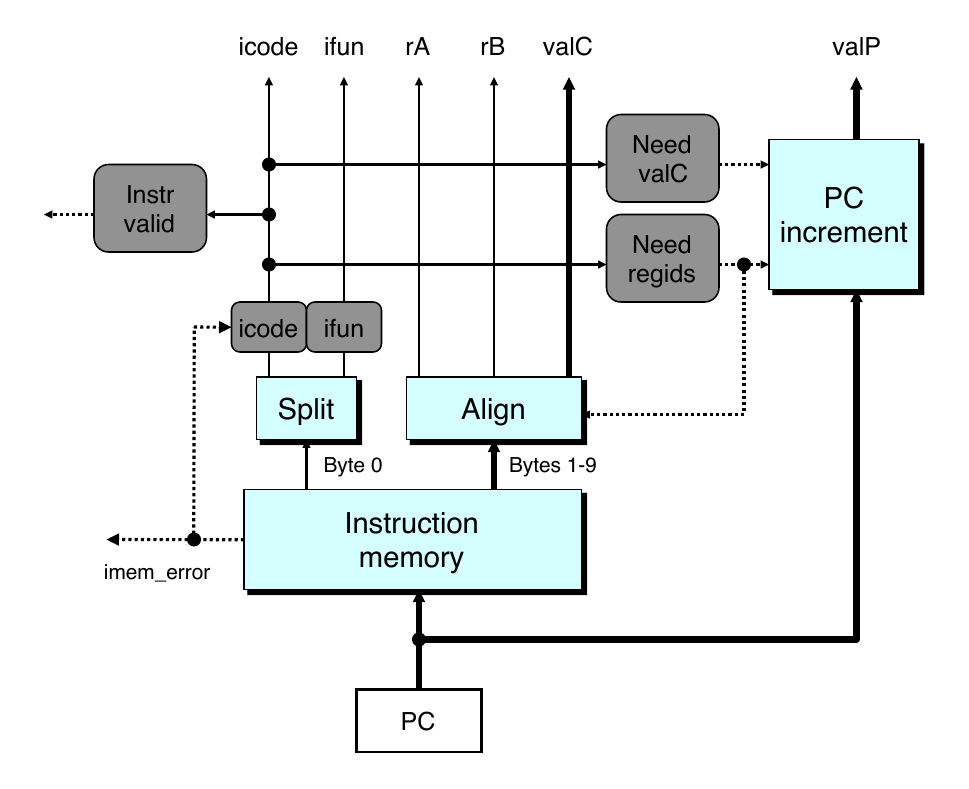
Fetch Logic
- Predefined Blocks
- PC: Register containing PC
- Instruction memory: read 10 bytes (PC to PC+9)
- signal invalid addresses
- Split: divide instruction byte into
icodeandifun - Align: get fields for
rA,rB, andvalC
- Control Logic
- Instruction valid: is the instruction valid?
icode,ifun: generate no-op if invalid address- Need
regids: does the instruction have a register byte? - Need
valC: does this instruction have a constant word?
Decode Logic
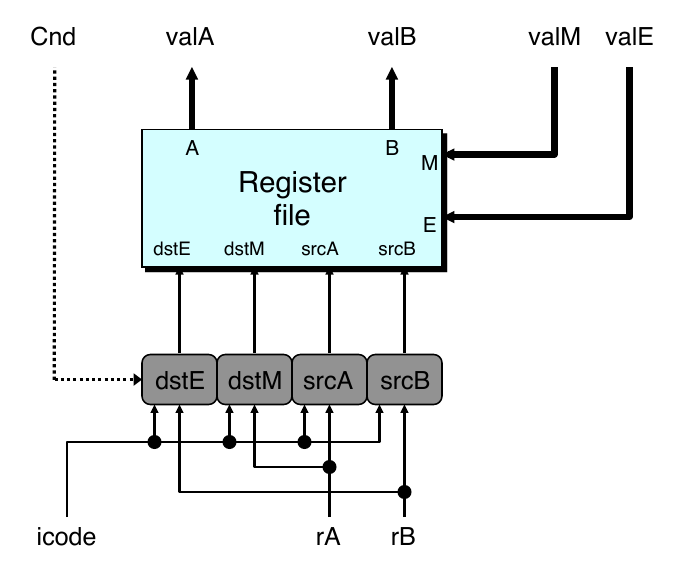
Decode Logic
- Register File
- Read ports A, B
- Write ports E, M
- Addresses are register IDs or 15 (
0xF) (no access)
- Control Logic
srcA,srcB: read port addressesdstE,dstM: write port addresses
- Signals
Cnd: indicate whether or not to perform conditional move (computed in execute stage)
Execute Logic

Execute Logic
- Units
- ALU: implements 4 required functions and generates condition code values
- CC: register with 3 condition codes
- cond: computes conditional jump/move flag
- Control Logic
- Set CC: should condition code register be loaded?
- ALU A: input A to ALU
- ALU B: input B to ALU
- ALU fun: what function should ALU compute?
Memory Logic
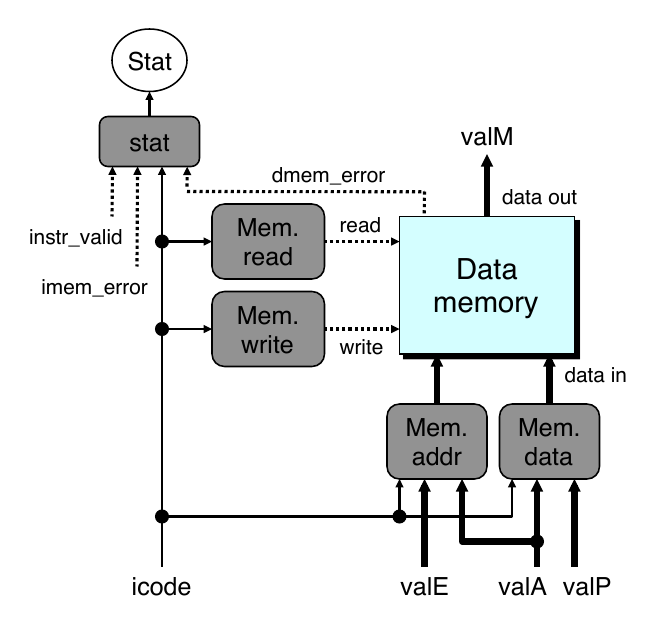
Memory Logic
- Memory
- Reads or writes memory word
- Control Logic
- stat: what is instruction status?
- Mem. read: should word be read?
- Mem. write: should word be written?
- Mem. addr.: select address
- Mem. data: select data
PC Update Logic
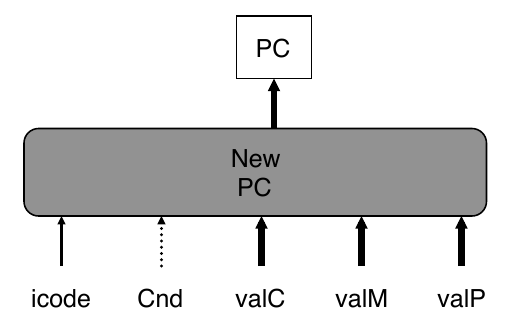
- New PC
- Select next value of PC
Sequential Summary
- Implementation
- Express every instruction as series of simple steps
- Follow same general flow for each instruction type
- Assemble registers, memories, pre-designed combinational blocks
- Connect with control logic
- Limitations
- Too slow to be practical
- In one cycle must propagate through instruction memory, register file, ALU, and data memory
- Would need to run the clock very slowly
- Hardware units only active for fraction of clock cycle